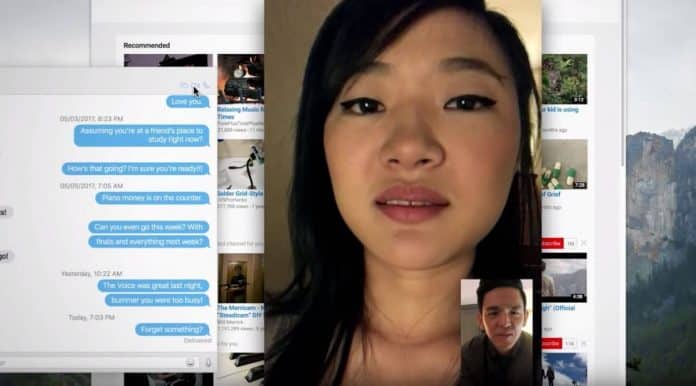How the John Cho thriller captures the specificities of Gen-Z Internet life with nuance and understanding.
No recent film has understood the Internet quite like Searching. Aneesh Chaganty’s 2018 thriller follows John Cho as David, a father desperately searching for his missing daughter. The film is formatted entirely on screens, a new form of visual storytelling called Screenlife. We see David’s investigation through video calls, websites, and digital files. But at the heart of the story is a deep understanding of the way people, especially young people, can take on new lives through technology.
Recent releases like Not Okay and Bodies Bodies Bodies show a developing category of Gen Z-focused films that look at how online culture has influenced young people, especially young women. Searching walks alongside this category but distinguishes itself in its approach. The girl at the heart of Searching is Margot (Michelle La), a teenager who has immersed herself in her digital world. Through various social media profiles and online accounts, Searching shows a person who exists more on a screen than in real life.
The layers of Margot’s online life reflect an authenticity toward understanding how young people exist on the internet. She has a Facebook filled with friends that she doesn’t really know, she uses her Tumblr to express her artistic side in photographs, and she spends her free time on a live streaming site talking to strangers. It’s a curated digital existence that makes Margot not just a person who uses technology, but a person who has built her life around the technology that reflects her personality.
The extreme realism of Searching’s style brings the audience deeper into one person’s digital world than ever before. Text messages to friends and family, homework assignments, and photo albums sit in the background, alluding to a fully realized teenager. An entire person becomes constructed through small glimpses on a screen.

Searching also has plenty to criticize about the current digital era. Through its format we see David obsess over endless news footage, read cruel comment sections, and find dark corners of the internet that prey on his fears. Searching’s online world is filled with people looking to hijack tragedy for attention, from random edgy teenage boys to Margot’s classmates who pretend to know her to capitalize on a trending topic.
But while Searching is eager to show the detrimental side of online life, it also embraces the positives. We see the life of someone who grew up on the internet, who’s had every moment chronicled in photos and videos. It’s easy to depict the influence of technology on everyday life as all-consuming, but Searching finds sweetness in being able to see small moments preserved forever.
Gen Z has been raised with greater Internet access than any generation before it. Movies often depict its influence on young people as one-sided: a malevolent force that corrupts or draws on people’s worst instincts. But Searching’s internet is a reflection of the real world. Margot’s online life is lonely, but it’s a reprieve from an even lonelier reality. We grow to understand why a young person would choose such an unknowable place. An online life of one’s own offers the possibility to balance the good and the bad of the Internet.
Film and TV loved to harp on the horror of being a teenage girl and the influence of the internet is an easy path for social commentary. It’s much more impressive to communicate how a complicated relationship to the internet can exist parallel to ourselves. Online lives can be a release. Technology can hold more memories than we can. Searching is the rare film that understands that digital life is still a life, and can be explored just as deeply as any other.